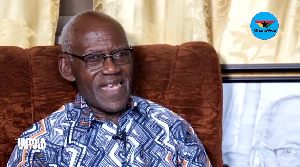- Home - News
- TWI News | TV
- Polls
- Year In Review
- News Archive
- Crime & Punishment
- Politics
- Regional
- Editorial
- Health
- Ghanaians Abroad
- Tabloid
- Africa
- Religion
- Election 2020
- Coronavirus
- News Videos | TV
- Photo Archives
- News Headlines
- Press Release
General News of Monday, 20 November 2006
Source: Statesman
Teachers' pay up by 400% in six years
Figures seen by The Statesman indicate that the annual salary of the ordinary teacher (Certificate A) has been increased by 437 % since 2000, from ¢3.2 million to ¢17 million. Though, the Finance Minister admits the wage levels are still low, in dollar terms, the accumulative percentage rise is 222.2% from $581 in 2000 to $1,873 in 2006. A Principal Superintendent has also seen a 402% rise in pay, from ¢6 million ($1,105) in 2000 to ¢30.3 million ($3,327) in 2006. What the figures also portray is that teachers of all levels have been given pay rises ranging from 350.3% (at the Assistant Director level) to 437.2%. These are mostly higher than the average wage increase for all the 650,000 public workers, which is at 360%. Under the New Patriotic Party, the accumulative rate of inflation to date is about 98.9%, indicating a real raise in purchasing power for salaried workers.
Projections already made by the Ministry of Finance and Economic Planning suggest that teachers may expect their salaries to increase at least from a range of ¢1.6 million to ¢3.5 million in 2007.
Out of a total annual national budget of ¢54.3 trillion, the Ministry of Education, Science and Sports has been allocated ¢11.3 trillion for 2007. In 2004, the Ministry received a budgetary allocation of ¢3.5 trillion. This more than doubled to ¢8.3 trillion by 2006.
On wages and salaries, the Finance Minister warns that Government "is having to make significant cuts to other essential cogs of national expenditure” in order to finance a public sector wage bill which is expected to hit ¢11 trillion this year and rise to ¢13.2 trillion in 2007, representing about 66% of total discretionary expenditures.
The Minister blamed the country's failure "to achieve a framework for rational discussion and decision-making over wages," for the various ad hoc attempts at solutions, which have generated "several different salary structures, fuelling tensions within the public services."
Government intends to set up a Fair Wages Commission to administer a comprehensive pay structure due to replace the Ghana Universal Salary Salary Structure which is to be abolished next year.
However, the opposition National Democratic Congress has described the 2007 budget as 'cut-and-paste", claiming it offers no new medium to long term solutions. Meanwhile a copy of budgetary proposals compiled by the Finance Minister and his team reveals how the PNDC and NDC regimes struggled to find workable policies for wages, jobs and energy.
"I find it very rich for the NDC to be accusing us of cut-and-paste policies. What we are rather committed to doing is to cut out the old budgetary culture of re-pasting unfulfilled promises and making them seem like new ideas to problems that cost the nation and its people dearly."
In the first budget of the PNDC, presented on May 24, 1982, Kwesi Botchwey noted that income policy over the years "created numerous distortions, inequity and contradictions. Numerous cases exist where persons with the same skill and responsibility receive different levels of remunerations…" It went on to say there was an on-going study to find an unambiguous policy on incomes.
24 years later, the current Finance Minister sees nothing being fundam entally achieved on that score.
He is supported by history in his retort that it was rather the P/NDC which had cut-and-paste as its stock in trade. The 1983 budget also promised to "redress the anomalies that exist in the structure of wages."
From 1985, the PNDC defended its inability to let wages match up to inflation by stressing on the link between productivity and income. Even in 1988, the PNDC was calling for private sector workers as well to exercise caution in their wage demands. The budget read on January 16 by Dr Botchwey urged that "the ability to pay principle be adhered to in the private, parastatal and government sector."
Admitting failure to address disequilibrium in the wage sector, it, however, said, "efforts at ensuring fair share of national income for workers must be informed by even more important need to ensure continued viability of enterprises in order to safeguard our employment objectives."
It explained what those objectives were: "If enterprises were forced to implement levels of wages that jeopardise profitability and investment, then we must expect that these enterprises will sooner or later collapse and throw their workers out of employment."
The income policy of 1990 sought through the Tripartite Committee on wages to again "narrow the gap in remuneration" between workers of "comparable experience and qualification."
Not even the pressures of democracy got any meaningful solution to be applied. The 1993 budget sought to "narrow the large disparities between the civil service and those of public sector organisations paid out of the Consolidated Fund."
The situation only worsened in 1995, with the budget announcing that the "consolidation of salary differential within the public service was widening," cautioning that "if the situation continued, the country could not achieve the stabilisation of the macro-economic environment." That year the budget had inflation target of 18%, inflation ended the year at 70.8%. In the budget read on February 2, 1996 the NDC again announced, "The distortion in the structure of the remuneration in the public sector continues to create discontent."
The confession was to become more profound, "Ever so often, circumstances have compelled us to resolve demands for improved remuneration in a manner that has also tended to worsen the situation. Thus, we seem to be caught in a vicious cycle where an attempt to resolve one particular problem ends up worsening the distortions."
It then commissioned PriceWaterHouse to come up with a policy to eliminate the distortions and disparities "that have plagued salary administration over the years."
By 1997, the NDC was still confident that the ongoing initiative "will lead to the elimination of the distortions and disparities…"
By 1998 the NDC promised a system of job rationalisation and productivity, to "once and for all" rectify the use of analogous grades/positions and titles instead of job content to determine salary levels.
By February 5, 1999, the NDC was once again confessing that the :implementation of government’s medium-long term public sector salaries and wages policy had been delayed several times in the past and was mainly due to the "underestimation of the technical work involved."
Though implementation of the GUSS took effect from January 1999, the current Finance Minister was forced by the challenging reality to say Thursday, "Mr Speaker, it is now time to take a decisive and long lasting action to rationalise the public sector wage issue once and for all."
The comprehensive 3-year pay reform programme, which started this year, is already expected to remove much of the distortions which remained under the GUSS. Phase II of the Public Sector Pay Structure expected to be completed in 2007 "will involve assessment of job content together with consequential placement of all public sector employees."
The whole nation should have the results of this latest initiative evident enough by November 2008. If implemented to the letter, the NPP should be confident enough to read the 2009 budget a month before an election which, at least in theory, could go to an opposition party.










